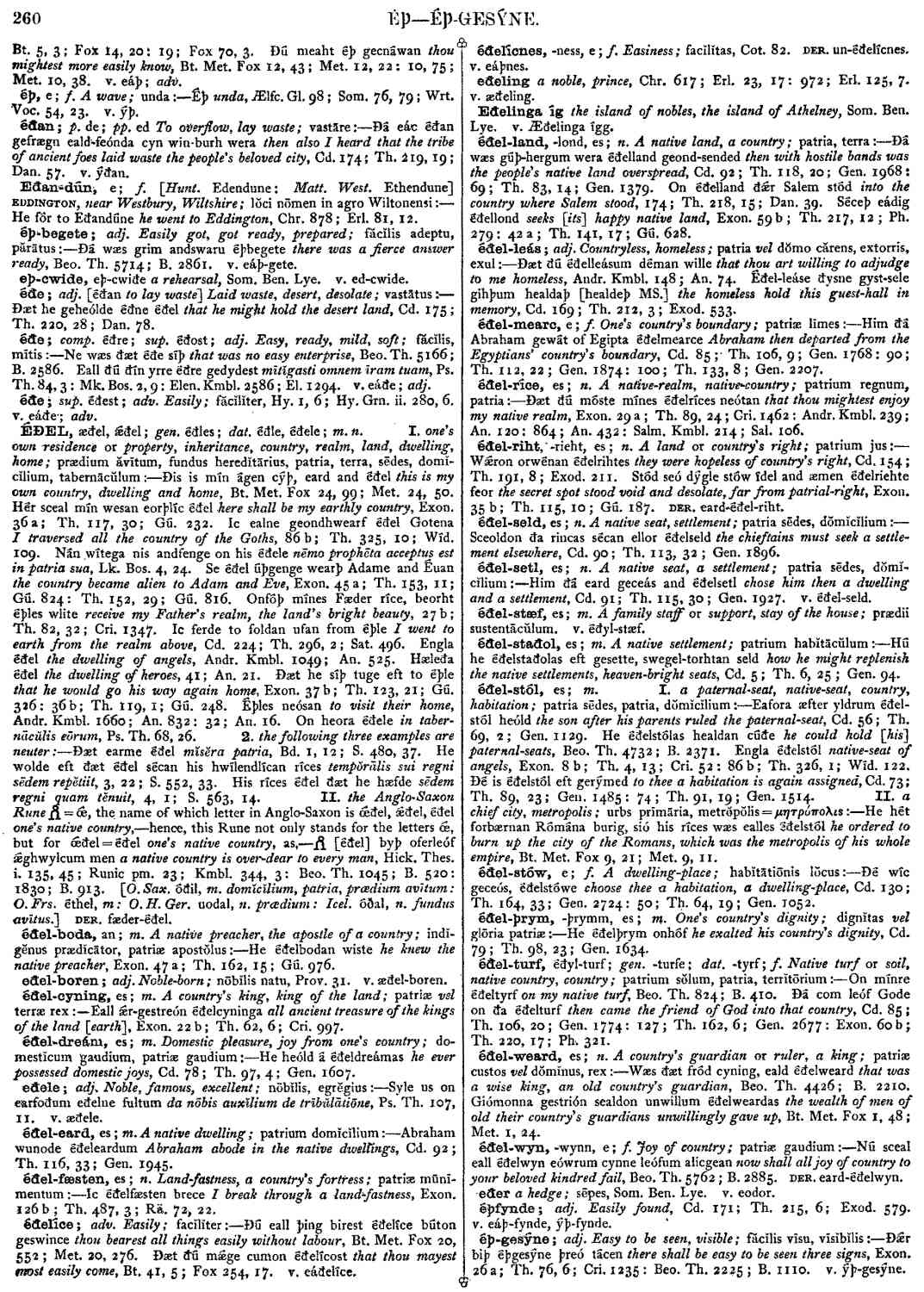ÉÐEL
- noun [ masculine ]
-
Ðis is mín ágen cýþ, eard and éðel
this is my own country, dwelling and home,
- Bt. Met. Fox 24, 99;
- Met. 24, 50.
-
Hér sceal mín wesan eorþlíc éðel
here shall be my earthly country,
- Exon. 36 a ;
- Th. 117, 30;
- Gú. 232 .
-
Ic ealne geondhwearf éðel Gotena
I traversed all the country of the Goths,
86 b;- Th. 325, 10;
- Wíd. 109 .
-
Nán wítega nis andfenge on his éðele
nēmo prophēta acceptus est in patria sua,
- Lk. Bos. 4, 24.
-
Se éðel úþgenge wearþ Adame and Éuan
the country became alien to Adam and Eve,
- Exon. 45 a ;
- Th. 153, 11;
- Gú. 824: Th. 152, 29;
- Gú. 816 .
-
Onfóþ mínes Fæder ríce, beorht éþles wlite
receive my Father 's realm, the land's bright beauty,
27 b;- Th. 82, 32;
- Cri. 1347 .
-
Ic ferde to foldan ufan from éþle
I went to earth from the realm above,
- Cd. 224 ;
- Th. 296, 2;
- Sat. 496 .
-
Engla éðel
the dwelling of angels,
- Andr. Kmbl. 1049 ;
- An. 525 .
-
Hæleða éðel
the dwelling of heroes,
- 41 ;
- An. 21 .
-
Ðæt he síþ tuge eft to éþle
that he would go his way again home,
- Exon. 37b ;
- Th. 123, 2 1;
- Gú. 326: 36b ;
- Th. 119, l;
- Gú. 248 .
-
Éþles neósan
to visit their home,
- Andr. Kmbl. 1660 ;
- An. 832: 32 ;
- An. 16 .
-
On heora éðele in tabernācŭlis eōrum, Ps. Th. 68, 26. 2. the following three examples are neuter Ðæt earme éðel
mĭsĕra patria,
- Bd. I, 12 ;
- S. 480, 37.
-
He wolde eft ðæt éðel sécan his hwílendlícan ríces
tempŏrālis sui regni sēdem repĕtiit,
- 3, 22;
- S. 552, 33.
-
His ríces éðel ðæt he hæfde
sĕdem regni quam tĕnuit,
- 4, I ;
- S. 563, 14.
- Hick. Thes. i. 135, 45: Runic pm. 23 ;
- Kmbl. 344, 3: Beo. Th. 1045 ;
- B. 520: 1830 ;
- B. 913 .
Bosworth, Joseph. “ÉÐEL.” In An Anglo-Saxon Dictionary Online, edited by Thomas Northcote Toller, Christ Sean, and Ondřej Tichy. Prague: Faculty of Arts, Charles University, 2014. https://bosworthtoller.com/9765.
Checked: 1